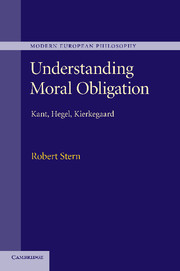Conclusion
From Kant to Kierkegaard – and back again?
Published online by Cambridge University Press: 05 January 2012
Summary
In the foregoing discussion, I have traced the issue of moral obligation as it has run through the work of Kant, Hegel, and Kierkegaard, shaping their relation to each other. In doing so, I have argued, I have put forward a different picture of the development of moral philosophy during this period from the one offered by what in the Introduction I called the standard story, which begins from what turns out to be a misconceived version of Kant’s argument from autonomy. I therefore hope to have offered a more convincing account of that argument, and also of the trajectory of moral philosophy from Kant onwards.
However, in following this journey, we have in fact been led round in a circle. For, as I presented it, Kant’s argument from autonomy was not directed against moral realism as such, but rather against divine command accounts of obligation; but in arriving at Kierkegaard, I have also claimed, it is with a divine command account that we have ended up. The obvious question this raises, then, is whether one of the three positions that make up this circle is to be preferred over the others, or whether their respective merits and demerits put them on a par, locked in a perpetual dialectical struggle with one another without hope of resolution.
- Type
- Chapter
- Information
- Understanding Moral ObligationKant, Hegel, Kierkegaard, pp. 220 - 254Publisher: Cambridge University PressPrint publication year: 2011

